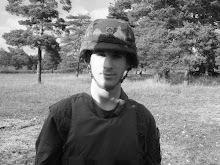
http://www.ehow.com/how_2195820_practice-opsec.html?ref=fuel&utm_source=yahoo&utm_medium=ssp&utm_campaign=yssp_art
Instructions
Step 1
Learn who should practice OPSEC. Military members, their husbands or wives, their children, their parents and extended family members and their friends should learn to not give out information in venues that can be easily accessed by just about anyone. They have a responsibility to protect the information they have access to from falling into the wrong hands.
Step 2
Understand what information is considered sensitive and even critical to the military. Information about the exact location of soldiers, troop movement (deployments, returns, TDYs and R&R included) and dates, times and time frames should never be disclosed. Information about weapon systems, training and numbers are also sensitive pieces of information. Missions, exercises and changes in duty hours at specific bases are also to be considered sensitive information that can be put together to give a better picture of what may be taking place or soon to be taking place. (Sara Tip: If you don't know if it's sensitive material, just say no! Don't let anything slip. "Loose Lips Sink Ships!)
Step 3
Know that just because it appeared on the news does not make it okay to talk about it. This will only verify the information. So what, it appears on the base website. Military-run sites are highly monitored. In other words, they know who frequents the sites, but OPSEC must still be practiced regardless of where the information appears.
Step 4
Keep sensitive information out of websites, journal posts, message boards and any other online forum and venue. We are taught not to put out too much information about ourselves on the Internet because of the personal dangers this can present, so why would anyone think it was okay to put down specific information regarding times, dates, time frames, locations and more that would allow people they do not know to view the information and do whatever they wanted with it? That puts our troops in more danger. (Sara Tip: Most underestimate the power of our new "enemies." They are not living in caves and mud huts. This is 2010. They have more technology and access to the internet than someone in rural Arkansas with dial-up.)
Step 5
Stop using decorative tickers on websites and in online venues. Many family members of deployed military have taken to using countdown tickers that give out specific information as to when the troop will return or a time frame, which breeches OPSEC. For those that really feel the need to broadcast this type of information, it would be better to have a ticker that indicates the amount of time their soldier has been gone, although it would be better to refrain from this completely. (Sara Tip: No one says you cant have one, just don't broadcast it. I fully intend on having a calendar in my own home so I know the number of days we have left. But no one else has to know that number)
Step 6
Refrain from sending sensitive information via emails and instant messages. We are well aware that emails and instant messages are not secure venues and information sent can wind up in the wrong hands.
Step 7
Never advertise specific information about a soldier. This would include not putting out information regarding the soldier's name, rank and unit. In photos, learn to black out the soldiers name tape and rank.
Step 8
Practice OPSEC when using telephones and cellphones. It may sound funny, but you never know who can be listening, right?
Step 9
Do not discuss sensitive information out in public venues. Think about it, you and a friend are on line at the supermarket and talking about a son’s upcoming deployment and the person standing behind you overhears. You just put sensitive information out there which can potentially compromise a mission and create danger for our troops. Learn to think before you speak and refrain from sensitive information conversations in public. (Sara Tip: Of course we Army wives need to vent and gripe. But do it in private. Find someone you trust; family, close friends, fellow Army wives; and be battle buddies! Vent to each other, find comfort in their experience and support. Your military family can be very helpful and healthy in these difficult times. They understand more about your situation than most.)
So as many of you know, this is our first deployment. I'm trying to cover everything, but if any of you have any tips or suggestions, please feel free to share!
















No comments:
Post a Comment